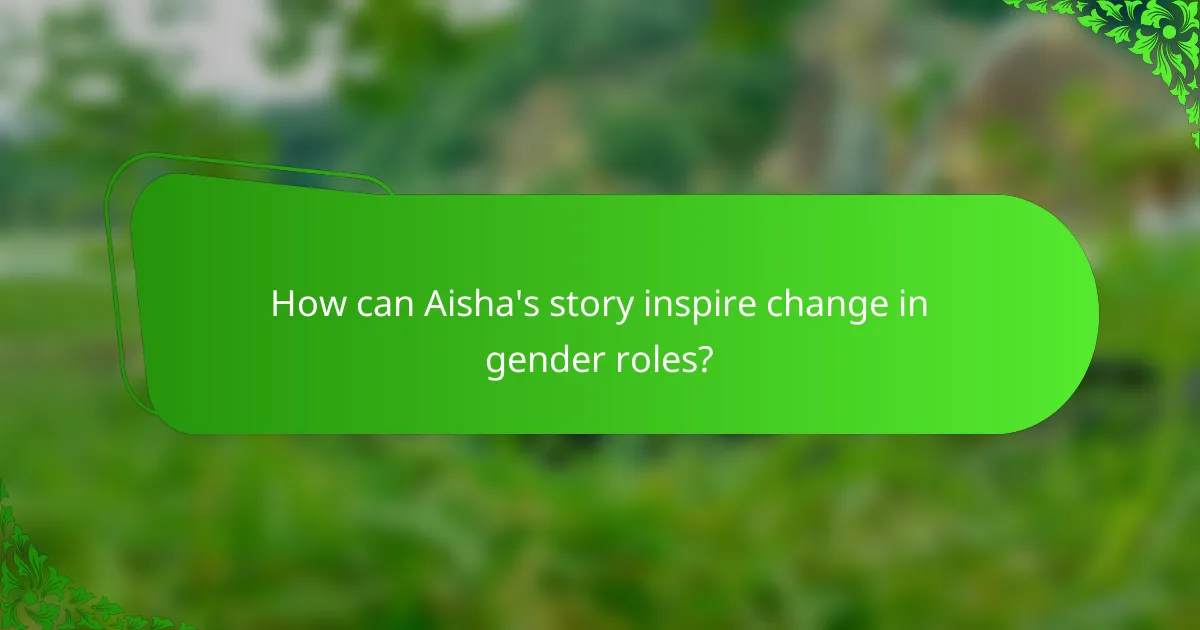Aisha’s narrative serves as a powerful lens through which to examine the impact of gender roles on identity and societal expectations. Contemporary discussions surrounding her life highlight the ongoing debates about gender equality and cultural practices, emphasizing the need to challenge traditional norms. By exploring Aisha’s story, we can inspire change and advocate for empowerment within communities.

How do gender roles impact Aisha’s societal discussions?
Gender roles significantly shape the societal discussions surrounding Aisha, influencing perceptions of her identity and the expectations placed upon her. These roles dictate behaviors, responsibilities, and opportunities, ultimately affecting her standing within her community.
Influence on family dynamics
Gender roles play a crucial part in defining family dynamics, often assigning specific responsibilities to men and women. For instance, traditional expectations may position Aisha as the primary caregiver, which can limit her autonomy and personal ambitions.
In many cultures, these roles can lead to conflicts within families, especially when individuals challenge established norms. Aisha’s desire for independence may clash with familial expectations, creating tension and necessitating open communication to navigate these challenges.
Effects on career opportunities
Gender roles can significantly restrict career opportunities for women like Aisha, often steering them towards lower-paying or less prestigious professions. In some regions, societal expectations may discourage women from pursuing careers in fields traditionally dominated by men, such as engineering or technology.
To counteract these limitations, Aisha can seek mentorship and support networks that empower her to break through barriers. Organizations that promote gender equality in the workplace can also provide resources and training to help women advance their careers.
Shaping cultural perceptions
Cultural perceptions of gender roles influence how Aisha is viewed within her society, affecting her self-image and the opportunities available to her. Stereotypes can lead to biases that undermine her capabilities and contributions, both personally and professionally.
To challenge these perceptions, Aisha can engage in community initiatives that promote gender equality and showcase the achievements of women in various fields. By actively participating in discussions and advocacy, she can help reshape cultural narratives and inspire future generations.

What are contemporary discussions surrounding Aisha?
Contemporary discussions surrounding Aisha focus on her role as a symbol of gender dynamics in various societies. These conversations often explore how her life and legacy reflect ongoing debates about gender equality, cultural practices, and the intersectionality of gender roles.
Debates on gender equality
Debates on gender equality often center around the interpretation of Aisha’s life in the context of modern values. Advocates for gender equality argue that her experiences highlight the need for reforms in cultural and religious practices that may perpetuate inequality. Critics may contend that traditional interpretations of her story reinforce patriarchal structures.
In many communities, discussions about Aisha can lead to broader conversations about women’s rights, access to education, and participation in leadership roles. These debates can vary significantly across different cultures, with some advocating for progressive changes while others emphasize the importance of tradition.
Intersectionality in gender roles
Intersectionality in gender roles examines how Aisha’s story interacts with various social identities, such as race, class, and religion. This perspective highlights that gender is not experienced in isolation but is influenced by multiple factors that shape individual experiences and societal expectations.
For example, in some regions, Aisha’s narrative may resonate differently among women of different socioeconomic backgrounds. Understanding these nuances is crucial for addressing the unique challenges faced by diverse groups of women and for fostering inclusive discussions about gender roles in contemporary society.

How can Aisha’s story inspire change in gender roles?
Aisha’s story can inspire change in gender roles by highlighting the importance of challenging traditional norms and advocating for equality. By showcasing her journey, individuals and communities can recognize the potential for empowerment and transformation in their own lives.
Empowerment through education
Education plays a crucial role in empowering individuals to challenge gender roles. By providing access to quality education, particularly for girls, communities can foster critical thinking and self-confidence. Programs that focus on STEM fields, leadership, and vocational training can equip women with the skills needed to break barriers.
For instance, initiatives that offer scholarships or mentorship opportunities can significantly impact young women’s aspirations. Communities should prioritize educational resources that promote gender equality, ensuring that both boys and girls learn about respect and shared responsibilities.
Community initiatives for awareness
Community initiatives aimed at raising awareness about gender roles can create a supportive environment for change. Workshops, seminars, and public discussions can engage both men and women in conversations about equality and respect. These initiatives can help dismantle stereotypes and encourage collaborative efforts toward a more equitable society.
Additionally, local campaigns that highlight successful role models, like Aisha, can inspire others to challenge societal norms. Collaborating with local organizations to host events or create media content can amplify the message and reach a broader audience, fostering a culture of inclusivity and respect.

What frameworks exist for analyzing gender roles?
Several frameworks help analyze gender roles, focusing on how societal norms shape behaviors and expectations. These frameworks provide insights into the dynamics of gender in various contexts, including family, work, and culture.
Gender role theory
Gender role theory examines how societal expectations dictate behaviors considered appropriate for men and women. It posits that individuals learn these roles through socialization processes, which can vary significantly across cultures and time periods.
Key considerations in gender role theory include the impact of media, education, and family structures on shaping perceptions of gender. For example, traditional media often portrays men as assertive and women as nurturing, reinforcing these roles in society.
Feminist perspectives
Feminist perspectives on gender roles critique the power dynamics and inequalities inherent in traditional gender roles. These viewpoints emphasize the need for social change to achieve gender equity and challenge stereotypes that limit individual potential.
Feminist theories often highlight the intersectionality of gender with other identities, such as race and class, affecting how individuals experience gender roles. For instance, women of different backgrounds may face unique challenges that influence their roles in society.

How do cultural contexts shape Aisha’s experiences?
Cultural contexts significantly influence Aisha’s experiences by dictating societal norms and expectations regarding gender roles. These norms vary widely across different regions, affecting opportunities, behaviors, and perceptions of women in society.
Regional variations in gender expectations
Gender expectations can differ greatly from one region to another, often rooted in historical, religious, and social factors. In some cultures, traditional roles may confine women to domestic responsibilities, while others may encourage their participation in the workforce and leadership positions. For example, in many Western countries, women have made substantial strides in professional fields, whereas in certain Middle Eastern nations, legal and social barriers still limit women’s rights.
Understanding these regional variations is crucial for recognizing the unique challenges Aisha may face. In areas with rigid gender norms, women might encounter significant resistance when pursuing education or careers, impacting their overall empowerment and agency.
Impact of globalization on local norms
Globalization has a profound effect on local gender norms, often leading to a blend of traditional and modern values. As cultures interact, women like Aisha may gain access to new opportunities, such as education and employment, that were previously unavailable. However, this can also result in backlash from conservative factions that seek to preserve traditional roles.
For instance, in urban areas of developing countries, exposure to global media can inspire shifts in attitudes toward gender equality, while rural areas may lag behind. It’s essential to recognize that while globalization can promote progress, it can also create tensions that affect women’s rights and societal roles.

What are the future trends in gender roles?
Future trends in gender roles indicate a shift towards greater equality and diversification of responsibilities across various sectors. As societal norms evolve, traditional roles are being redefined, allowing for more inclusive participation in both professional and domestic spheres.
Emerging roles in technology
Technology is increasingly becoming a field where gender roles are blurred, with women taking on significant positions in areas like software development, data science, and cybersecurity. Initiatives aimed at encouraging girls to pursue STEM education are gaining traction, leading to a more balanced workforce.
Companies are recognizing the value of diverse perspectives in tech innovation. This has resulted in programs that support women in tech through mentorship, networking, and funding opportunities, helping to bridge the gender gap in this critical industry.
Shifts in traditional family structures
Traditional family structures are evolving, with more households embracing shared responsibilities between partners. Dual-income families are becoming the norm, leading to a redistribution of domestic tasks and childcare duties, which were historically assigned based on gender.
These shifts are supported by changing societal expectations and policies that promote parental leave for both mothers and fathers. As a result, men are increasingly taking on active roles in parenting, which further challenges conventional gender roles and fosters a more equitable environment for future generations.










